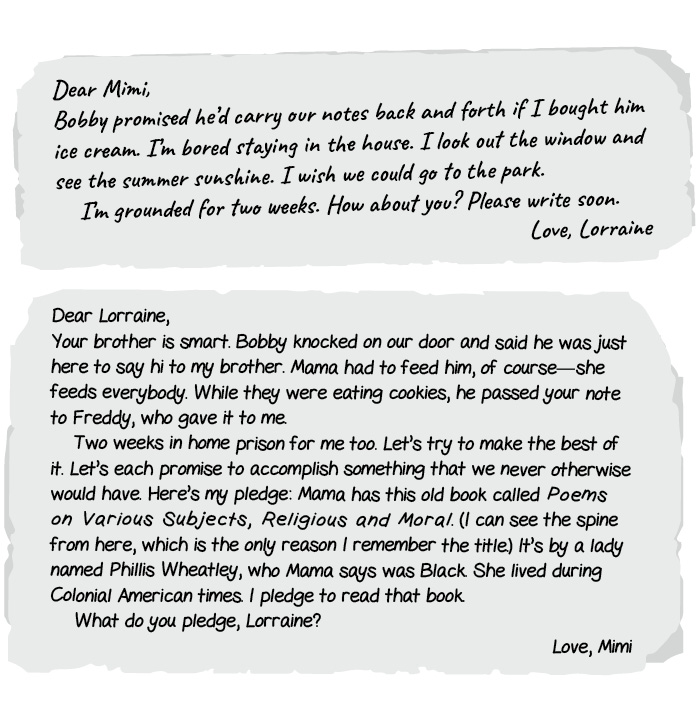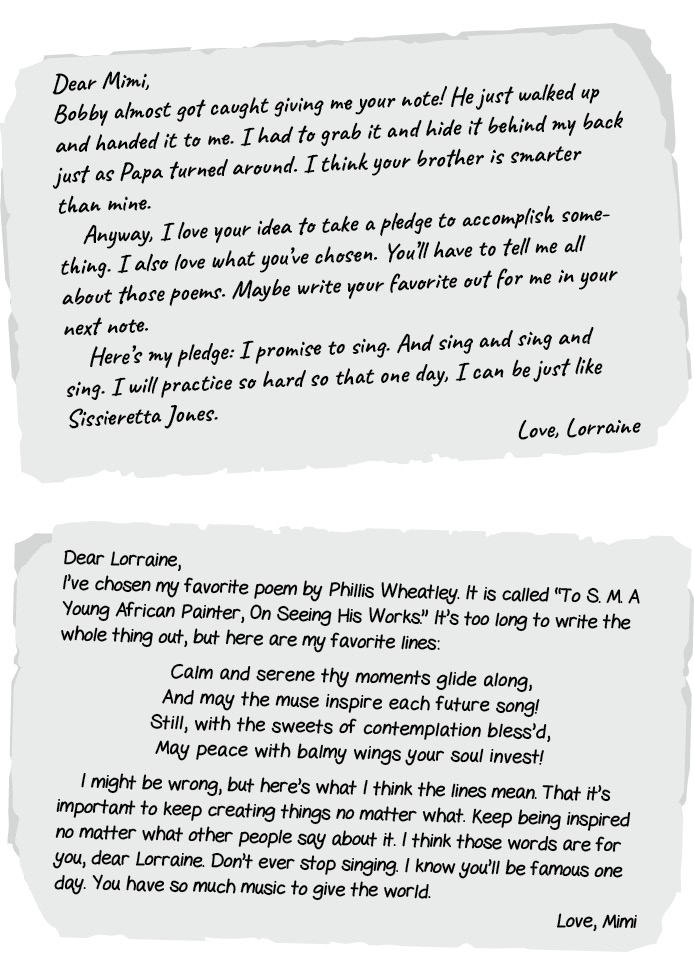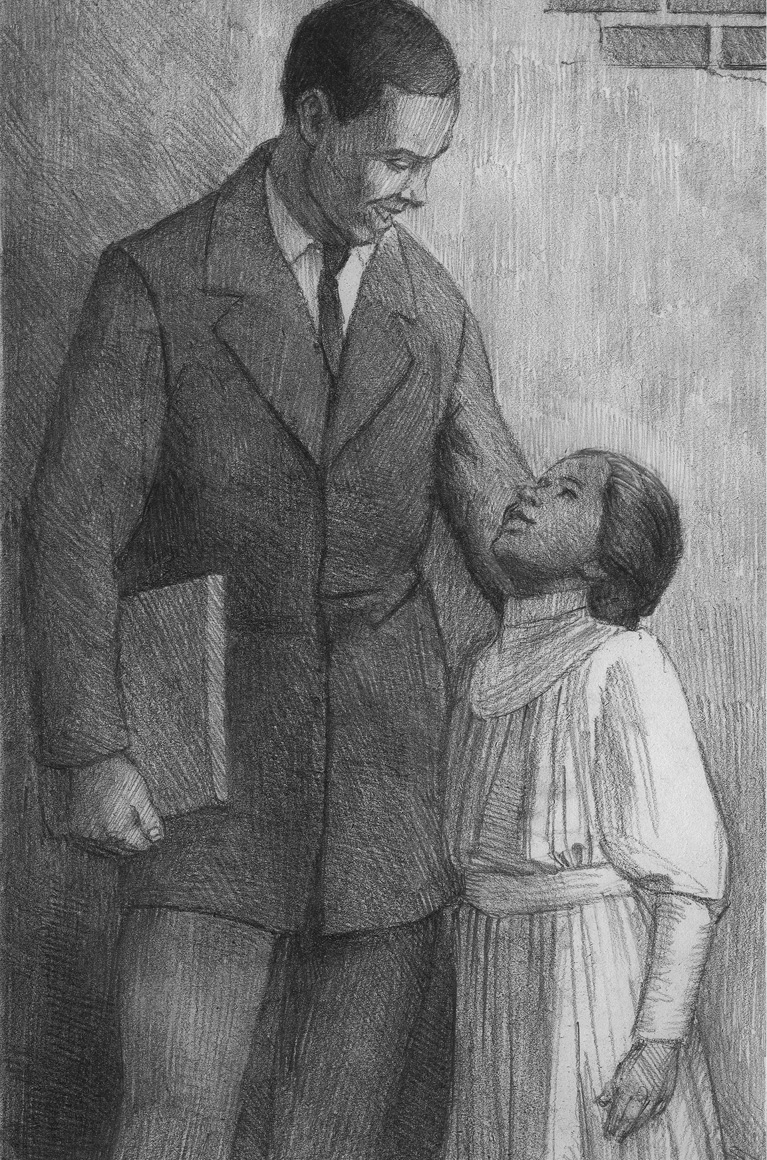Chapter 10
“But Papa, I—”
“Quiet, child! I don’t want to hear it! There is no excuse. None!”
Lorraine and Mimi had gotten off the elevated train at Thirty-Fifth Street, only to find both of Mimi’s parents, Lorraine’s father, and a police officer waiting for them.
While Papa glared at Lorraine with his arms folded, the officer spoke with a calmer voice and an Irish accent. “You gave your folks quite a turn. I know the Expo is fun and exciting, but it’s not safe for two girls unattended.”
“We were fine,” Mimi grumbled.
“You could have been kidnapped,” her father said. “We’re going home now.” He turned to the police officer. “Thank you, officer.”
Mimi turned back to Lorraine as her father tugged her toward the iron stairs down to the street. “I’ll see you la—”
“No, you won’t,” Lorraine’s father said flatly. “Lorraine won’t be seeing anyone for a while. She needs time to think about what she’s done.”
“Same goes for Mimi,” said Mrs. Dupré. When Mimi let out a groan, her mother added, “Not a peep out of you. You will stay home and do chores and pray for the next two weeks.”
Lorraine listened glumly to the Duprés clomping down the staircase. She couldn’t bear to look Papa in the eye. The police officer said, “Well, I’ll leave you to it, Mr. Williams.”
“Yeah. Thanks,” said Papa. Once the officer had left, he said, “Two weeks at home for you too.”
Lorraine and her father walked slowly down the stairs, not speaking. Anger and frustration burned inside her chest. She wanted so much for Papa to understand why she’d gone to the Expo. But she didn’t know if she’d ever find the words.
They kept up the silence all the way home.
“You’re back!” Bobby shouted enthusiastically. In seconds, his arms were around Lorraine. Normally, she would have pushed him off her and said something snarky. But today she hugged back, feeling the tears sting her eyes.
When she finally let go of Bobby, Papa said, “There’s some soup.”
Lorraine just shook her head and went into her room, wondering why a Black girl should be punished for trying to show a Black singer how much she loved her.


Lorraine held Mimi’s note to her chest. She’d been stuck at home, barely talking to Papa, for over a week. Mimi’s kind words and those beautiful lines of poetry—Lorraine just couldn’t take it.
Before she knew it, she was crying. Her anger and confusion gushed from her throat: the feeling that Papa had betrayed her, that her fellow African Americans had turned on her; her frustration that nobody seemed to agree with her point of view; her sadness that she would probably never get to hear Miss Jones sing again, let alone get to study singing with her; and how her own little life would go right back to the way it was. Nothing could stop the sobs from escaping.
There was a banging on her door. “Go away,” she cried into her hands, figuring her father wanted her to be quiet. “Just go away.”
Papa opened the door anyway. Instead of yelling at her, he rushed to sit on the edge of the bed next to her and pressed her head to his shoulder.
“Don’t cry, my Rainie. Don’t cry.” He kissed the top of her head. “It’s okay. Everything’s okay. Tell me why all these tears, my beautiful Rainie.”
As furious as she’d been with him, feeling Papa’s strong arms around her calmed Lorraine right away. She burrowed in deeper and talked into his shirt. “I’m sorry, Papa.”
“I’m sorry too, angel.”
She pulled her head back and they looked at each other. The last time she’d seen tears glistening in Papa’s eyes was when Bobby got the flu a few years back, and the doctor wasn’t sure he would make it.
“I just wanted to hear Miss Jones. I just want to be like her, Papa. A strong Black woman who can sing so fine that people of every race on earth stop and say, ‘My, my, would you listen to that!’”
“I know.” Papa gave her a tired smile. “And I just wanted to do what was best for our community.” Laughing a little, he said, “And now I’m not even sure it was the right thing. But one thing I do know, Miss Rainie Williams. You scared your poor, old papa half out of his skin when you disappeared like that. I can’t lose you. I cannot lose you. You understand?”
Lorraine nodded. Hugging him close, she cried quietly. Suddenly, her brother ran into the room. “Papa and me are having a private talk, Bobby. Can it wait?”
“No. Papa, the man from church is downstairs. He says he has to talk to you.”
“What man from church?” Papa asked.
“The one with the big mustache.”
Lorraine sat up straighter. “Do you mean Mr. Morris, the choir director?”
“Yeah, that’s him. Said it was important.”
“Let’s go see what he wants,” Papa said, nudging Lorraine.
“But I can’t leave the apartment.”
“It’s okay. You can come. I think you’ve done enough soul searching. We both have.”
A huge weight flew off Lorraine’s heart. She practically skipped down the stairs and out onto the stoop, with Bobby and Papa right at her heels. “Good day, Mr. Morris,” she called cheerfully as she stepped outside.
“Good day, Lorraine. Will I see you in church tomorrow?”
“Yes, sir.” Just then, Lorraine noticed the choir director had not come alone.
“Hello, Lorraine.” It was Mrs. Dupré.
“Hello. Oh!” Lorraine gasped when she saw Mimi standing behind her mother. “Hi, Mimi!”
Mimi waved shyly, as if she couldn’t quite believe it either.
“We wanted to show you this, Joseph,” said Mr. Morris, holding out a copy of the Chicago Conservator, a newspaper written by and for Chicago’s Black residents. “I know how keen Lorraine has been to support the fair, and I’ve been quite dismissive of her.” He nodded at the Duprés. “It seems these nice people had a similar notion, and we met here by chance.”
Papa took the paper and unfolded it, angling the front page so Lorraine could see it too.
Lorraine put her hand over her mouth to stifle a squeal. Could this really be happening? She dared to glance at her father’s face.

Papa had a look she recognized, a big frown with his lips closed and both eyebrows raised as high as they could go. He got that look when he was changing his mind.
“Well, I’ll be,” he said. “Mr. Douglass makes some sense.”
Mr. Morris piped up. “He’s won me over. I think we should celebrate the fact that our city is hosting this spectacular exposition.”
“Yes, indeed,” said Mrs. Dupré.
Lorraine went to stand next to Mimi, who whispered, “I get the feeling they were all dying to hear it was okay.”
It took some effort for Lorraine not to laugh out loud.
“Don’t mind saying,” said Papa, “I sure would like to take my family to the fair. After all, my daughter’s an expert. She could be our tour guide. We’ll have to see if I can earn enough extra change to make that happen.”
Suddenly, Lorraine remembered something very important. “Miss Jones gave me a bunch of tickets. We can all go to the fair!”

The whole group cheered. “After all,” said Papa with a grin, “Mr. Douglass said it was fine.”
Maybe my letter convinced him. That thrilling thought kept running through Lorraine’s mind.
Wednesday, June 28, 1893
Dear Diary,
Papa is finally going to the fair! We’re all going to hear Miss Jones sing tomorrow. Bobby’s coming, plus Mimi and her family, and even Mr. Morris and his wife.
They all asked Mimi and me for advice on how to take the elevated train too! None of the adults have ever done it before. Mimi and I felt so sophisticated.
There are so many things I want to share with Papa, but here’s the most important: I want to take him on the Ferris Wheel. That way he can get a good look at this amazing and magical world he helped build.
Love, Lorraine